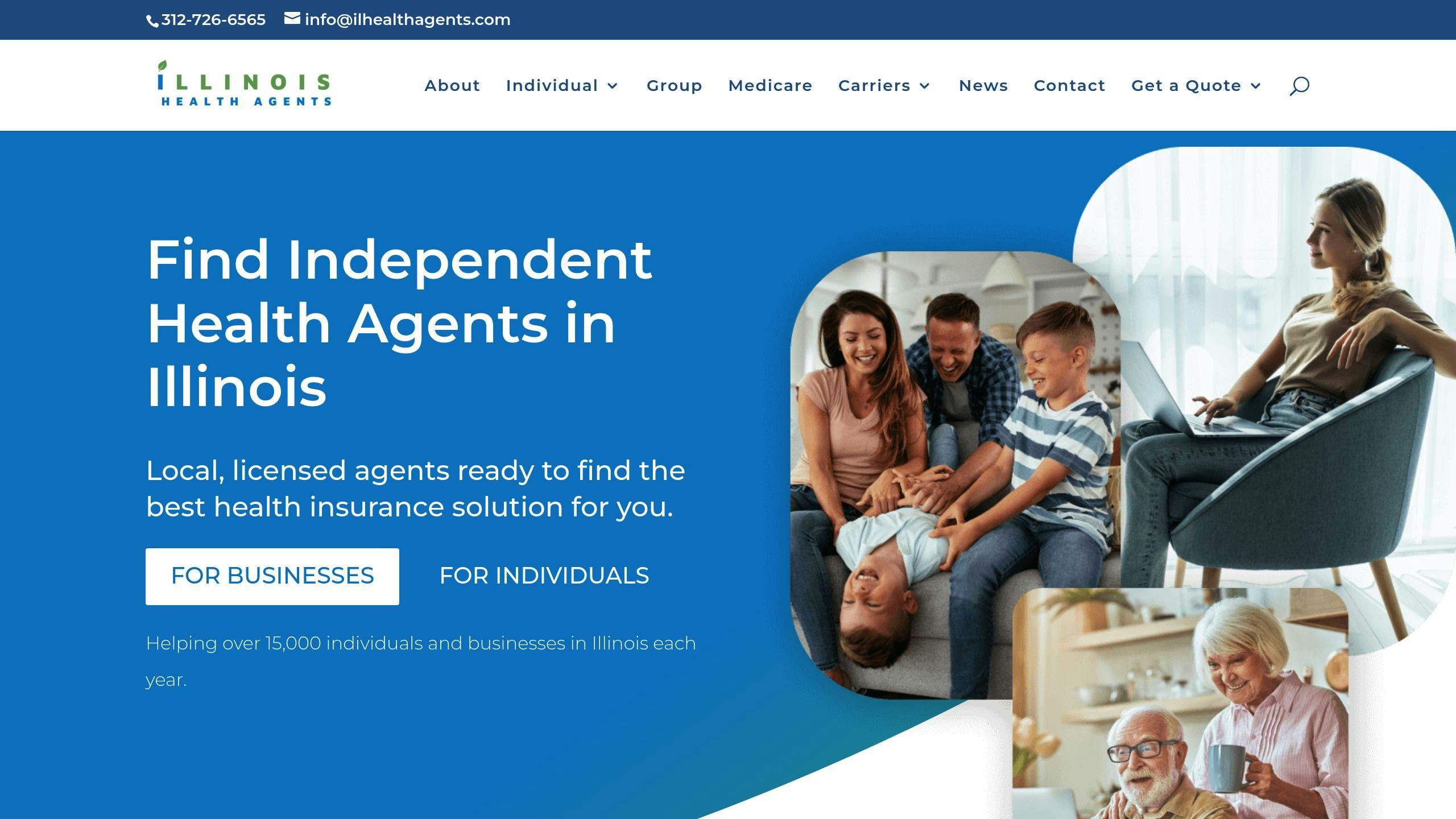For self-employed individuals, health insurance can be challenging without employer-sponsored plans. Thankfully, there are 8 key options, each tailored to different needs and budgets:
- ACA Marketplace Plans: Broad coverage with subsidies and tax deductions.
- Health Savings Accounts (HSAs): Tax-advantaged savings paired with high-deductible plans.
- Short-Term Insurance: Temporary, affordable coverage with limited benefits.
- Professional Association Plans: Group insurance through industry organizations.
- Group Health Insurance for Small Businesses: For those with at least one employee.
- Medicare and Medicaid: Government programs for eligible individuals.
- Private Insurance Plans: Flexible but typically unsubsidized options.
- Brokerage Services: Help navigating and selecting the right plan.
Quick Comparison Table
| Option | Pros | Cons | Best For |
|---|---|---|---|
| ACA Marketplace Plans | Subsidies, comprehensive coverage | Higher premiums without subsidies | Those with fluctuating incomes |
| HSAs | Tax benefits, long-term savings | Requires high-deductible plan | Those comfortable with higher deductibles |
| Short-Term Insurance | Affordable, flexible | Limited coverage, excludes pre-existing | Temporary gaps in coverage |
| Professional Association | Group rates, tailored benefits | Requires membership | Specific industries or professions |
| Group Insurance | Employee perks, tax-deductible | Requires at least one employee | Small business owners |
| Medicare/Medicaid | Low-cost or free | Strict eligibility requirements | Low-income or seniors |
| Private Insurance | Broad network, customizable | No subsidies, higher costs | Those not eligible for subsidies |
| Brokerage Services | Expert guidance, plan comparison | May charge fees for small businesses | Anyone seeking tailored advice |
Choose a plan based on your healthcare needs, budget, and eligibility. Brokers can simplify the process, and regular reviews ensure your coverage stays aligned with your evolving situation.
How To Get Better Health Insurance If You’re Self Employed
1. ACA Marketplace Policies
For self-employed individuals with unpredictable incomes, ACA plans provide a mix of cost-effective options and extensive health coverage.
Cost Benefits
ACA Marketplace Policies include premium tax credits to help reduce monthly premiums based on income. Additionally, self-employed individuals can claim a 100% tax deduction on their health insurance premiums.
What’s Covered?
ACA plans cover a wide range of healthcare needs such as preventive services, hospital visits, prescription medications, and mental health care.
Who Qualifies?
Self-employed individuals can enroll in ACA plans without needing employees. Enrollment is open during the Open Enrollment Period or after major life changes through Special Enrollment.
Plan Options
ACA plans are divided into four tiers, allowing flexibility based on budget and healthcare needs:
| Plan Level | Premium Cost | Out-of-Pocket Costs | Ideal For |
|---|---|---|---|
| Bronze | Lowest | Highest | Those seeking minimal monthly payments |
| Silver | Moderate | Moderate | Individuals eligible for cost-sharing reductions |
| Gold | Higher | Lower | People who frequently need medical care |
| Platinum | Highest | Lowest | Those requiring extensive healthcare services |
Silver plans are especially attractive to self-employed individuals who qualify for cost-sharing reductions, as they can greatly lower out-of-pocket costs.
While ACA Marketplace Policies offer broad coverage, options like HSAs can provide additional ways to manage healthcare expenses.
2. Health Savings Accounts (HSAs)
Health Savings Accounts (HSAs), paired with high-deductible health plans (HDHPs), offer a practical way for self-employed individuals to manage healthcare expenses while building savings for the future. They’re a good fit for those who are comfortable with higher deductibles and want to take advantage of tax benefits.
Tax Perks and Financial Features
HSAs come with several tax perks and financial advantages:
- Tax benefits: Contributions are tax-deductible, funds grow tax-free, and withdrawals for qualified medical expenses are also tax-free.
- Year-to-year rollover: Unused funds roll over annually, letting you build long-term savings.
- Investment options: Many HSA providers allow you to invest your funds, potentially growing your savings over time.
- Portability: The account stays with you, even if you change insurance plans or jobs.
- Emergency use: Funds can act as a financial cushion for unexpected healthcare costs.
Who Can Open an HSA?
To open an HSA, you need to meet these criteria:
- Be enrolled in a high-deductible health plan (HDHP).
- Have no other health coverage.
- Not be enrolled in Medicare.
- Not be claimed as a dependent on someone else’s tax return.
What Does It Cover?
HSAs can be used for a variety of medical expenses, such as routine care, preventive services, dental treatments, and vision needs. You can also use the account to pay for qualified medical expenses for your family members.
If you’re looking for a temporary healthcare option, short-term health insurance could be another route to consider.
3. Short-Term Health Insurance
Short-term health insurance is a temporary solution for self-employed individuals needing coverage during brief gaps. While it doesn’t match ACA plans in coverage or HSAs in tax benefits, it offers a cost-effective option for specific situations.
Affordability
Short-term plans are known for their lower premiums, but there are trade-offs:
- Premiums depend on factors like age and health, and there are no annual out-of-pocket maximums.
- Medical services often come with higher out-of-pocket expenses.
Coverage
These plans focus on basic medical needs but lack the extensive coverage of ACA-compliant options:
| Covered Services | Usually Not Covered |
|---|---|
| Doctor visits | Pre-existing conditions |
| Hospital stays | Maternity care |
| Emergency care | Mental health services |
| Basic prescriptions | Substance abuse treatment |
| Urgent care |
Eligibility
Short-term plans have straightforward eligibility requirements. You may qualify if you:
- Are under 65 years old.
- Can pass basic medical underwriting.
- Are in good health and don’t need ongoing treatments.
Flexibility
One of the key benefits of short-term plans is their flexibility. They can begin at any time, last up to 12 months, and may be renewable for up to 36 months in certain states. Most plans also lack network restrictions, giving you more provider options.
These plans work well for healthy individuals needing temporary coverage in situations like:
- Job transitions.
- Waiting for Medicare eligibility.
- Gaps outside ACA open enrollment periods.
- Starting a business while building income.
If you’re looking for group coverage or have specific professional requirements, exploring professional association plans might be a good alternative.
4. Professional Association Plans
Professional association plans (AHPs) give self-employed individuals access to group health insurance through industry organizations. By pooling resources, these plans often secure better rates and benefits, especially for niche industries or professions.
Affordability
AHPs can help cut costs by leveraging group purchasing power:
- Lower premiums compared to unsubsidized individual plans
- Tax-deductible premiums and reduced administrative expenses
- Risk pooling within the industry to maintain stable rates
Coverage
These plans often include benefits tailored to specific industries. Here’s a breakdown:
| Basic Coverage | Additional Benefits |
|---|---|
| Preventive care | Prescription medications |
| Hospital stays | Surgical procedures |
| Emergency services | Specialist visits |
| Primary care | Lab work and diagnostics |
Eligibility
To enroll in an AHP, you generally need to:
- Be an active member of the sponsoring association
- Have sufficient income to cover premiums
- Work within the relevant industry or profession
Flexibility
Organizations like the National Association for the Self-Employed (NASE) and the Alliance for Affordable Services provide a variety of plans. Options include different deductible levels and network choices designed to suit members’ needs.
While AHPs might not offer as much customization as individual marketplace plans, they strike a balance for self-employed individuals who don’t qualify for large ACA subsidies.
"Professional association plans can offer a cost-effective alternative to individual market plans for self-employed individuals who do not qualify for subsidies. However, they may not provide the same level of customization as individual plans or the comprehensive coverage of ACA marketplace policies".
For those managing small teams or needing broader coverage, group health insurance for small businesses might also be worth exploring.
sbb-itb-a729c26
5. Group Health Insurance for Small Businesses
If you’re self-employed and have at least one employee, small business group insurance plans can provide health coverage for both you and your team. These plans come with benefits tailored to small businesses, helping you manage costs while offering solid coverage.
Cost Savings
Group health insurance can help lower expenses through tax-deductible premiums, shared contributions between employers and employees, and discounts based on the size and makeup of the group. For self-employed individuals leading small teams, these plans can be a smart way to offer employee perks while also securing your own health coverage.
What’s Covered?
Group health plans comply with ACA standards and include a range of benefits:
| Core Benefits | Additional Services |
|---|---|
| Preventive care | Prescription drugs |
| Emergency services | Mental health care |
| Hospitalization | Maternity services |
| Outpatient care | Laboratory services |
Who Qualifies?
To be eligible for group health insurance, you’ll need to:
- Employ at least one W-2 worker besides yourself.
- Meet your state’s specific requirements for group coverage.
- Ensure that employees sign up for the plan.
Plan Options
Group health insurance offers choices to suit different teams:
- Plan types like PPOs, HMOs, and HDHPs.
- Various combinations of premiums and deductibles.
- Add-ons like dental, vision, and digital management tools.
"Group health plans offer comprehensive coverage at lower costs but less flexibility in plan options".
If group coverage isn’t an option or you need individual insurance, programs like Medicare or Medicaid might be worth exploring.
6. Medicare and Medicaid Plans
Medicare and Medicaid are government programs designed to provide low-cost health coverage to eligible individuals, including those who are self-employed.
Eligibility
Medicare is available to:
- People aged 65 and older
- Those under 65 with certain disabilities
- Individuals with End-Stage Renal Disease
Medicaid, on the other hand, is generally for individuals and families with low incomes, typically up to 138% of the federal poverty level in states that expanded Medicaid under the ACA.
Coverage
| Medicare Parts | Services Covered |
|---|---|
| Part A | Hospital stays, skilled nursing care |
| Part B | Doctor visits, outpatient care, preventive services |
| Part C (Medicare Advantage) | Combines Parts A & B |
| Part D | Prescription drug coverage |
Medicaid covers critical services like doctor visits, hospital care, and preventive treatments for individuals with limited income.
Affordability
Medicare Part A is free for most people who have paid Medicare taxes for at least 10 years. Part B, however, requires a standard monthly premium of $174.70 in 2024. Additional financial help is available through programs like Extra Help.
Medicaid is often even more affordable, with no premiums, low copayments, and little to no deductibles, making it an accessible option for those who qualify.
Options
Medicare offers choices such as Original Medicare, Medicare Advantage plans, and Medigap for supplementary coverage.
For self-employed individuals with limited income or those nearing retirement, these programs can be a lifeline, especially when private insurance is out of reach.
"According to the Centers for Medicare & Medicaid Services (CMS), Medicare now covers over 65 million people, while Medicaid serves more than 83 million Americans, providing vital health coverage for those who might otherwise struggle to afford private insurance."
If you’re not eligible for these government programs, private health insurance plans can still provide a reliable alternative.
7. Private Insurance Plans
Private insurance plans give self-employed individuals a way to secure health coverage outside of government programs or group plans. While these plans often mirror ACA marketplace options in coverage, they typically don’t qualify for premium tax credits.
Coverage
These plans cover key health services such as preventive care, emergency services, hospitalization, prescription drugs, and mental health care. They often come with access to larger provider networks and allow for more personalized coverage options compared to marketplace plans.
Costs
Premiums vary based on factors like age, location, and the level of coverage chosen. For 2024, individual monthly premiums for a Silver plan generally range between $400 and $700. While private plans might not directly offer savings through ACA subsidies, self-employed individuals may still benefit from tax deductions or cost-sharing reductions.
Plan Options
Private insurance plans are structured into metal tiers – Bronze, Silver, Gold, and Platinum – offering flexibility to balance premium costs with out-of-pocket expenses. This setup allows you to pick a plan that suits both your healthcare needs and budget.
Eligibility
The eligibility requirements for private insurance are straightforward. You must:
- Reside within the plan’s service area
- Be a U.S. citizen or legal resident
- Not be incarcerated
- Apply during Open Enrollment (usually November through January) or qualify for Special Enrollment
For self-employed individuals who don’t qualify for ACA subsidies or want more tailored options, private insurance can be a strong choice. Evaluating your healthcare needs and financial situation is crucial, and working with a licensed broker can help simplify the process and ensure you find the right plan.
8. Brokerage Services (e.g., Illinois Health Agents)

Brokerage services are a helpful resource for self-employed individuals dealing with the challenges of health insurance. Brokers act as middlemen between clients and insurance providers, making it easier to find affordable and suitable health insurance options.
Plan Options and Customization
Brokers simplify the task of comparing different types of plans, including ACA, short-term, group, and HSA-compatible options. Their knowledge helps you choose a plan that matches your specific needs while balancing coverage and costs.
Coverage Details
With access to a variety of plans from multiple carriers, brokers can connect you to options that include preventive care, prescriptions, and specialist visits. Their expertise ensures you get the coverage that aligns with your healthcare priorities.
Cost Considerations
Most brokers offer free consultations for individual plans. For small businesses, there may be modest fees, such as $250 per year for companies with up to 10 employees – though this fee is often waived if all 10 employees enroll.
Brokers help manage costs by:
- Comparing rates across different carriers
- Highlighting potential tax benefits
- Finding plans eligible for premium subsidies
- Recommending cost-sharing strategies
Eligibility Requirements
To work with a broker, you need to live within their service area, meet basic insurance qualifications, and provide proof of self-employment.
When choosing a broker, make sure they are licensed in your state and experienced in working with self-employed clients. Using a broker’s expertise can simplify the process of choosing health insurance, giving you confidence in selecting the right plan.
Conclusion
Finding the right health insurance as a self-employed individual takes some effort, but it’s essential to weigh your options carefully. Your choice should balance your specific healthcare needs with what you can afford, creating a plan that works for your unique situation.
ACA Marketplace plans are a common starting point, offering subsidies and broad coverage for those who qualify. Health Savings Accounts can help you save on taxes while setting money aside for medical expenses. Short-term insurance might be a solution for temporary needs, while professional association plans can provide group-style benefits. Private insurance also broadens the range of choices available.
To pick the best plan, consider your healthcare requirements, budget, and whether you qualify for subsidies or tax advantages. Brokers can guide you through the process, helping you explore all your options and find the coverage that fits.
Thanks to the American Rescue Plan Act of 2021, more affordable coverage is now within reach for many self-employed individuals through expanded subsidies. Whether you navigate the process alone or with professional help, understanding these options gives you the tools to make informed decisions about your health coverage.
Choose a plan that meets your current needs but also allows room for future adjustments. Regularly reviewing your coverage ensures it stays aligned with your circumstances and budget, especially as market options and regulations shift. Staying proactive helps you maintain affordable, effective coverage as your business and life evolve.
FAQs
Here are answers to some common questions self-employed individuals have about health insurance options.
How much does health insurance cost per month for a self-employed person?
The average 2024 Marketplace rates are listed below. Costs may be much lower for those who qualify for subsidies:
| Age Group | Single Coverage | Family Coverage (2 parents, 2 kids) |
|---|---|---|
| Age 25 | $375/month | $1,320/month |
| Age 40 | $477/month | $1,525/month |
What health insurance options are available for self-employed people?
Many self-employed individuals turn to the Health Insurance Marketplace® for their coverage needs. Popular choices include:
- Marketplace plans that provide essential health benefits
- Subsidies to lower premiums and out-of-pocket expenses for eligible individuals
- Coverage for pre-existing conditions with no benefit limits
Some also pair their insurance with a Health Savings Account (HSA). When used with a qualifying high-deductible health plan, an HSA offers tax benefits and helps manage healthcare expenses. This approach balances coverage and savings effectively.




0 Comments